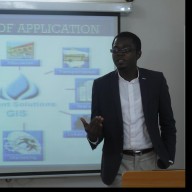
I promised to always keep you updated on the evolving Geo-APIs emerging in our Geo-world. Here are some newest ones courtesy of Programmable Web.
 European Alien Species Information Network API: The service from the European Alien Species Information Network (EASIN) catalogs and reports on presence of invasive and non-native species within the European environment. It provides listings of animals and plants transplanted from other regions, such as fish carried into the Mediterranean Sea from other waters by ship traffic. It helps to track and map new and potentially invasive species within Europe.
European Alien Species Information Network API: The service from the European Alien Species Information Network (EASIN) catalogs and reports on presence of invasive and non-native species within the European environment. It provides listings of animals and plants transplanted from other regions, such as fish carried into the Mediterranean Sea from other waters by ship traffic. It helps to track and map new and potentially invasive species within Europe.
API methods support search against the database for a specific species or for a region, with results in XML with options for mapping. Methods are complaint with standards such as OpenSearch, Open Geospatial Consortium (OGC), and Taxonomic Databases Working Group (TDWG).
 Insiteo Suite API: Insiteo is an indoor location mapping service that can be integrated with mobile applications and data collection services and aims to increase site profitability, data intelligence, customer experience and satisfaction levels. The Insiteo Suite of APIs is comprised of six APIs which can be used independently or together to create indoor mapping applications. The suite includes the indoor location, interactive mapping, pathfinding and navigation, geofencing, meet me, and lone worker protection API.
Insiteo Suite API: Insiteo is an indoor location mapping service that can be integrated with mobile applications and data collection services and aims to increase site profitability, data intelligence, customer experience and satisfaction levels. The Insiteo Suite of APIs is comprised of six APIs which can be used independently or together to create indoor mapping applications. The suite includes the indoor location, interactive mapping, pathfinding and navigation, geofencing, meet me, and lone worker protection API.
 Afla.MD API: The service provides current reports from schools and educational institutions in the former Soviet republic of Moldova. It exposes lists and details of Moldovan educational institutions, accessible by name or geographic region, and provides performance scores based on data provided by the institutions. The service is intended to encourage review, awareness, and scrutiny of activities in schools within the country.
Afla.MD API: The service provides current reports from schools and educational institutions in the former Soviet republic of Moldova. It exposes lists and details of Moldovan educational institutions, accessible by name or geographic region, and provides performance scores based on data provided by the institutions. The service is intended to encourage review, awareness, and scrutiny of activities in schools within the country.
API methods support listing of schools and institutions by educational level and geographic location. For each institution, methods support access to details about infrastructure, language, student population, and finances. The API also provides scores by area of study and gender.
 Brownbook OpenSearch API: The service provides listings from a directory of business organizations categorized by product offerings, including both goods vendors and service providers. Search access is provided in compliance with OpenSearch standards. Keyword look-up or programmatic integration provides listings for individual businesses providing a desired product.
Brownbook OpenSearch API: The service provides listings from a directory of business organizations categorized by product offerings, including both goods vendors and service providers. Search access is provided in compliance with OpenSearch standards. Keyword look-up or programmatic integration provides listings for individual businesses providing a desired product.
API methods support access to the listings compliant with the OpenSearch format. Methods allow submission of a query term and and geographic location. The API returns a results list from the business directory local to the specified place and matching that term, with a link to view details for each business on the provider’s platform.
 FloraBrasil API: The service provides a catalog of plant species in Brazil with the goal of supporting documentation and conservation of flora across national, regional and local areas within the country. It is part of the Brazilian government’s commitments under the international Convention on Biological Diversity (CBD) to support the Global Strategy for Plant Conservation (GSPC).
FloraBrasil API: The service provides a catalog of plant species in Brazil with the goal of supporting documentation and conservation of flora across national, regional and local areas within the country. It is part of the Brazilian government’s commitments under the international Convention on Biological Diversity (CBD) to support the Global Strategy for Plant Conservation (GSPC).
API methods support access to a checklist of plant organisms by genus, species, and subspecies, with parameters for output language, data format, etc. Methods also support listings of categories of organisms, geographic locations, and related characteristics of the Brazilian environment.
 Fulcrum API: Fulcrum provides cloud based data collection for mobile devices supporting the creation, deployment, and management of location based data collection applications. Fulcrum’s API provides clients with a RESTful interface for automating access to data and pictures, form elements, account setup info, and more.
Fulcrum API: Fulcrum provides cloud based data collection for mobile devices supporting the creation, deployment, and management of location based data collection applications. Fulcrum’s API provides clients with a RESTful interface for automating access to data and pictures, form elements, account setup info, and more.
 PaleoDB API: The service provides a record of fossils found and documented, including their locations, the organisms represented, and their living environment at the time when they were alive. It compiles paleobiology information to document plant and animal life at specific points in space and time. Information about individual fossils and species is supported by broader taxonomic information.
PaleoDB API: The service provides a record of fossils found and documented, including their locations, the organisms represented, and their living environment at the time when they were alive. It compiles paleobiology information to document plant and animal life at specific points in space and time. Information about individual fossils and species is supported by broader taxonomic information.
API methods support HTTP GET requests for fossil occurrences documenting presence of an organism, or a distinctive part of an organism, identified with a location and timeframe. The API gives access to records compliant with the XML format of the Species 2000 Catalogue of Life to provide taxonomic, stratigraphic, geologic, and geochronological data along with records of particular fossils and organisms.
 Eppraisal API: The service provides estimates of selling prices for homes and other real estate. For a specified property location, it returns a range of values from low to middle to high. It is available as a web form for individual submissions, a series of embeddable widgets, or via web service.
Eppraisal API: The service provides estimates of selling prices for homes and other real estate. For a specified property location, it returns a range of values from low to middle to high. It is available as a web form for individual submissions, a series of embeddable widgets, or via web service.
API methods support specification of a location as a U.S. Postal Service Zip Code. The API returns a median value along with most expensive and least expensive values, based on reported real estate transactions in the area.
 FindPeopleFree API: The FindPeopleFree service provides information on persons and businesses located in the UK. Users can submit a city name or postcode, select a region within that location, and retrieve the names, addresses, and phone numbers of persons or businesses therein. This service can be accessed using either a web console or API. The API uses SOAP calls issued in XML format. The only requirement for implementing the service elsewhere is that users must provide credit to FindPeopleFree.co.uk in the manner specified on the site.
FindPeopleFree API: The FindPeopleFree service provides information on persons and businesses located in the UK. Users can submit a city name or postcode, select a region within that location, and retrieve the names, addresses, and phone numbers of persons or businesses therein. This service can be accessed using either a web console or API. The API uses SOAP calls issued in XML format. The only requirement for implementing the service elsewhere is that users must provide credit to FindPeopleFree.co.uk in the manner specified on the site.

 There are plenty of local discovery apps that let’s you find what you need in unfamiliar neighbourhood. But the problem is that you are always stuck with trusting the recommendations of strangers who might have really horrible taste… New iPhone App called Alike is trying to solve this issue.
There are plenty of local discovery apps that let’s you find what you need in unfamiliar neighbourhood. But the problem is that you are always stuck with trusting the recommendations of strangers who might have really horrible taste… New iPhone App called Alike is trying to solve this issue. Alike is one of those start-ups that tries to make use out of huge amount of data from recommendation services. Founder Maria Zhang is a big data and machine learning enthusiast who previously worked at Microsoft on the Personal Relevance team at MSN. And as a result, Alike is more of a big data platform than a pure local recommendations app. The real goal here is to collect data based on user behaviour and response, and help the Alike engine improve its recommendations and the suggestions it makes as time goes on.
Alike is one of those start-ups that tries to make use out of huge amount of data from recommendation services. Founder Maria Zhang is a big data and machine learning enthusiast who previously worked at Microsoft on the Personal Relevance team at MSN. And as a result, Alike is more of a big data platform than a pure local recommendations app. The real goal here is to collect data based on user behaviour and response, and help the Alike engine improve its recommendations and the suggestions it makes as time goes on.










